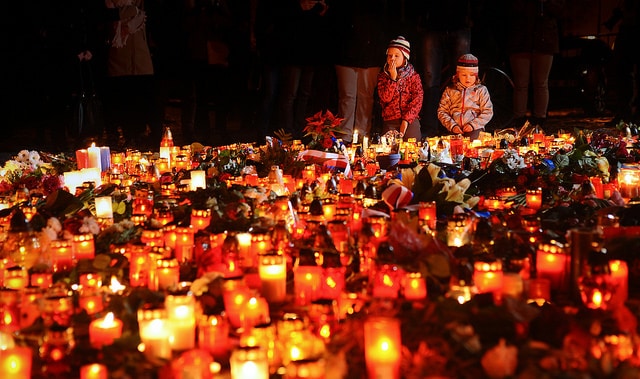God loves everyone. I don’t.
Recent months have seen a flurry of humanitarian crises throughout the world. These crises almost invariably unfold the same way: A horrendous event occurs. A great outpouring of sympathy and support follows. Then comes a backlash from people saying that helping such persons is not our responsibility. Finally a swift reaction from those who urge us to love and care for the afflicted no matter where they are from.
This script has played out most notably in the Syrian refugee crisis. The tragic plight of these displaced persons called for immediate action. Many, including persons with considerable political authority, denied that they had any such responsibility. The response was swift and powerful. How could anyone not love these people, it was often asked. How could anyone not want to take all of these people into their home? Don’t you see that rejecting these refugees is just like turning Mary and Joseph away from the inn???
This public debate unsettles me, and frankly, I feel distant from these tragedies. On principle I do not like when terrible things happen around the world, and am opposed to them. But I can’t say that I love those people, or that my heart is really breaking for them.
Don’t get me wrong: I want to love people I see on the news. I truly do. When I think of how much I love my mother and father, my dearest friends, it makes me sad that I can’t muster a similar love for the countless victims of terrorist attacks. It comes down to this, if I am honest: love can be hard work, even with those we love dearly. How much harder is it to maintain that love for those half a world away? Can that love be anything more than a passing emotional response?
God loves everyone. Why can’t I? Based on what I read on Facebook and Twitter feeds, everyone else around me seems to love refugees. Why can’t I bring myself to this? There have even been a few times in recent weeks when, if I am being honest with myself, I struggled to muster compassion and outrage at their treatment, while everyone else seemed to be riding an emotional wave of solidarité.
 And I think the key word is emotion. As I scan this social media landscape, I worry that we are unconsciously drawn into a kind of political theater, of “slacktivist outrage.” We express our discontent by bandwagoning on the latest cause, by linking to such-and-such an article, or by shading our profile picture in solidarity. At its best, it demonstrates how passionate – how emotional – we are about an issue, and we want to show our care. We huff with conspicuous anger for a few days…we add a Tricolore fade to our profile pic… then the cause dies down, and…we go on living our lives as before. I submit that for all these good intentions, shaking our fist at the internet does little to change injustices. If anything, our bandwidth of compassion gets narrower as we are flooded with more unsettling news. Love demands more of us than a catchy hashtag.
And I think the key word is emotion. As I scan this social media landscape, I worry that we are unconsciously drawn into a kind of political theater, of “slacktivist outrage.” We express our discontent by bandwagoning on the latest cause, by linking to such-and-such an article, or by shading our profile picture in solidarity. At its best, it demonstrates how passionate – how emotional – we are about an issue, and we want to show our care. We huff with conspicuous anger for a few days…we add a Tricolore fade to our profile pic… then the cause dies down, and…we go on living our lives as before. I submit that for all these good intentions, shaking our fist at the internet does little to change injustices. If anything, our bandwidth of compassion gets narrower as we are flooded with more unsettling news. Love demands more of us than a catchy hashtag.
* * *
I was not sure what to make of all these mixed feelings until I read David Brooks’s recent piece on religion and violence. One particular line caught my eye: “Alongside the ethic of love there is a command to embrace an ethic of justice. Love is particular, but justice is universal. Love is passionate, justice is dispassionate.”
Yes, I thought. Love is terribly particular. To love entails a relationship between particular people. I love Mom, Dad, Ann, Matthew, Mama, Patricia, Cody, Michael, Kathryn… These are the particular people in my life to whom I can attach names, memories and even hopes for the future. I can only understand love in the particular; when human ‘love’ is writ universal, it loses its immediate demand on me, and thus its meaning. With a refugee I see on TV, I have no relationship, no history, no shared experiences. I do not know her name, she does not know mine, and we do not know each other’s stories. Yes, I recognize that I ought to care about her, and I want to care about her more than I do. But that is not the same thing as what I share with my family and friends, and I would be kidding myself were I to say that it is.
So here is my Advent confession: I fear that I would turn Joseph and Mary away from the inn.
But I’m not a cynic, and my limited love is not the end of the story. Even if I do not love refugees as I do my kin, my conscience reminds me that I owe them something — and that strange stirring is important. I think that feeling is the stirring of justice.
Justice, unlike universal love, is something I can muster. However I feel about other people, I owe them something. I know I owe them a “respect of the other,” as Brooks says, that will require “struggle and sometimes conquering… selfish instincts.” Justice will not be easy for me, either; but at least it is something tangible and realistic. Justice asks far more mundane, “dispassionate” questions: regardless of my affinities, what is each person due? and, Who ought to help him or her secure it?
Justice is a commitment to stop and think — and sometimes justice is boring. Indeed, the whole point of “social justice” is that meaningful social and political change requires observation and reflection, awareness and analysis. Compared to love, justice is boring. Yet it is important spade work, and it is a long-term investment. I don’t just want to do something just: I want to be just, and that means renewing my affirmation of the value of respect for the other each day. It means accepting that my efforts won’t see immediate results.
Justice transcends tribalism and nationalism in favor of the good of all. Justice seeks out injustices, but it does not fight fire with fire. Love can stir passionate responses to injustices — for those parties we love. But justice demands a dispassionate response, with an eye towards the future. If I pursue justice, I cannot simply react to this or that crisis. I must step back and ask how society as a whole can be proactive to improve the lot of all parties, especially those most in need.
This entails looking into history to see patterns of injustice, and how they have been overcome in the past. After World War II, for example, there was a thirst for vengeance against Nazi war criminals. But American Supreme Court Justice Robert H. Jackson instead worked with Allies to establish the world’s first international war tribunal. He gave each defendant a fair trial in Nuremberg. As chief prosecutor, Jackson wrote,
“That four great nations, flushed with victory and stung with injury, stay the hand of vengeance and voluntarily submit their captive enemies to the judgment of the law, is one of the most significant tributes that Power ever has paid to Reason.”
The same principles of justice guide international war tribunals to this day — yes, even for unlovable despots and murderers.
Justice, like true love, is not an emotion: it’s a habit! My point is not that I should not at least try to love as God loves. Far from it! My point rather is that to love as God loves is hard work. It does me no good to pretend that I have mastered it. And I hope that, by striving to be just, I can see that I still bear some kind of responsibility for the wellbeing of people that I don’t love. I hope, actually, that justice cuts through the passionate particularity of my love and challenges me to a concern for another whom I don’t love. As Pope Benedict wrote in his letter Deus Caritas Est (“God Is Love”): “faith liberates reason from its blind spots and therefore helps it to be ever more fully itself.” In a similar way, justice liberates love from its blind spots, so that it can be more fully loving. Then love — the real love to which we are called as Christians — can become a habit too, not just a passing emotional response.
* * *
We all struggle to love as God loves. Without a basis in justice, love can be impulsive, rash in action, dismissive of prudence, and impatient for results. It can be too easily impressed by superficial understandings of situations, and settles on simplistic solutions. It can easily latch onto a “cause,” one perhaps that helps salve our unconscious guilt that we don’t do enough for others. We’re right to feel stirred to respond to wrongs in the world: it’s a good sign that our conscience is working. But how should we respond to it?
At least for me, that stirring is rooted in the call to love as God loves. That call is a challenge, and I want to face it head-on as just such a challenge. I’m not there yet, and so I don’t want to pretend to be. In the meantime, I’ll strive for justice. I’m not ready to say that I ‘love’ Syrian refugees, that I am willing to drop everything and do whatever I can for them. But I do want to research what is going on. I do want to learn what they need, how I can help in the short-term, and in what ways we all need to help in the long-term. Most importantly, I don’t want to be a fair-weather friend to the Syrian refugees just for a social media cycle. Nor do I want to be a friend only to the Syrian refugees just because the media have singled them out. I want to re-orient my life, slowly but surely, to acting in justice toward others. And that includes to people I don’t know — and thus do not love.
Because when Joseph and Mary approach me this Christmas Eve, love may not prompt me to let them through the door. But hopefully justice will stir a response. And that’s a start.
-//-
Title image (“Prague Prays for Paris”) by Bianca Dagheti is available on Flickr here.
Photo of the Eiffel Tower, by Yann Caradec, is available on Flickr here.
“Sorry” by JRWooley6 is available on Flickr here.


